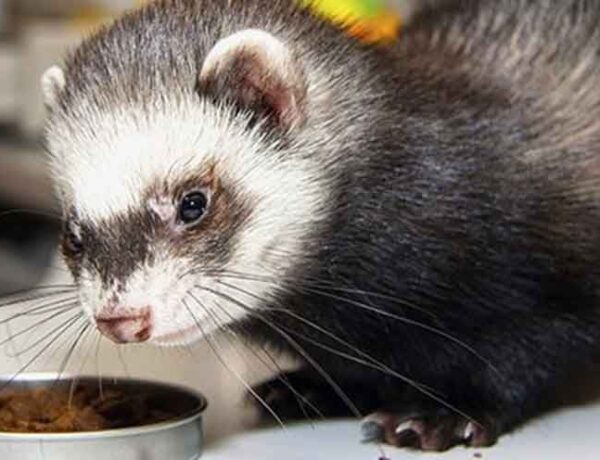Introduction
Can Ferrets Live Outside: Ferrets, playful and curious creatures, have long been cherished as pets by enthusiasts around the world. However, one common question that arises among potential ferret owners is whether these charming animals can thrive when kept outdoors. The idea of allowing ferrets dark to live outside may seem appealing, but it also raises concerns about their safety, well-being, and overall suitability for such an environment. In this discussion, we will delve into the factors to consider when contemplating whether ferrets can live outside, exploring the challenges, benefits, and essential considerations for providing a suitable outdoor habitat for these beloved pets. The decision to house ferrets outdoors is a complex one that involves a careful balance between the natural instincts and needs of these animals and the potential risks posed by exposure to the elements, predators, and other environmental factors.
Ferrets, originally domesticated from European polecats, have adapted to life alongside humans, typically residing indoors in controlled environments. Nevertheless, there are instances where outdoor living arrangements can be viable and even advantageous, especially for those with ample space and proper safeguards in place. In this exploration, we will explore the various aspects of whether ferrets can live outside, including considerations regarding shelter, climate, socialization, and overall well-being. By examining the potential benefits and challenges associated with keeping ferrets outdoors, individuals considering this option can make informed decisions about the welfare of these charming and mischievous pets.
To gain a deeper understanding of whether ferrets can live outside, we must consider several crucial factors. One of the primary considerations is shelter. Ferrets require a secure and weather-resistant enclosure to protect them from the elements, including extreme temperatures, rain, and wind. Adequate shelter should include a cozy and insulated sleeping area, as well as space for play and exercise. Climate is another critical factor. Ferrets are highly sensitive to temperature extremes, particularly heat. They are susceptible to heatstroke, which can be fatal, so ensuring they have a cool and shaded area during hot weather is essential. In contrast, they can also be vulnerable to cold temperatures, so provisions must be made to keep them warm in colder months.

Is it OK to keep ferrets outside?
Yes you can. Ferrets love playing outside in the snow, and enjoying tunneling and chasing one another. Playing provides excellent environmental and mental stimulation for them. You should make sure you keep your ferrets on a leash and harness if they’re playing outside, to prevent them from escaping.
Ferrets, known for their playful and curious nature, are beloved pets in many households. However, the question of whether it’s acceptable to keep ferrets outside remains a topic of debate and consideration among ferret owners. While it is possible to provide outdoor accommodations for ferrets, there are numerous factors to weigh in deciding whether it is the right choice for these charming animals.
Outdoor living can provide more space for ferrets to explore and play, which is beneficial for their physical health and mental stimulation. Some ferret enthusiasts argue that outdoor enclosures can better mimic a natural environment, allowing ferrets to exhibit more natural behaviors like digging and hunting. Outdoor living can help mitigate the musky odor that ferrets are known for, which can be a concern in indoor settings. For individuals with allergies to pet dander or sensitivities to ferret odors, keeping them outside can help reduce exposure.
Ferrets are sensitive to temperature extremes, especially heat. Without proper shelter and climate control, they can be at risk of heatstroke or hypothermia. Outdoor ferrets face potential dangers from predators such as raccoons, foxes, and birds of prey. A secure enclosure is essential to protect them. Ferrets are highly social animals that thrive on human interaction and companionship. Outdoor ferrets may not receive the same level of socialization as those kept indoors. Monitoring the health of outdoor ferrets can be more challenging, and access to veterinary care may be less convenient.
Can ferrets live outside year round?
Although ferrets are generally more tolerant of cold than hot weather whether or not you keep them inside or outside, they will require some special care and considerations throughout the colder months of the year, to ensure they remain happy and healthy.
One of the most significant factors to contemplate when considering year-round outdoor living for ferrets is the climate. Ferrets are highly sensitive to temperature extremes. They have a limited tolerance for both extreme heat and cold. In regions with harsh winters, the risk of hypothermia and frostbite is a significant concern. Conversely, in areas with scorching summers, ferrets can be prone to heatstroke, which can be life-threatening.
To accommodate ferrets outdoors throughout the year, you would need to provide a climate-controlled and insulated shelter, ensuring they are adequately protected from extreme temperatures. This could involve heating systems for winter and cooling mechanisms for summer. Keep in mind that the cost and maintenance of such systems can be substantial.
Outdoor ferrets are vulnerable to various predators, including raccoons, foxes, and birds of prey. A secure and predator-proof enclosure is an absolute necessity to keep ferrets safe. Regular checks for potential breaches or signs of predator activity are vital to ensure their well-being.
Ferrets are social animals that thrive on human interaction and the companionship of their own kind. Outdoor living may limit their opportunities for socialization, leading to loneliness and behavioral issues. If you choose to keep ferrets outdoors year-round, ensure they receive regular attention, playtime, and interaction to maintain their emotional well-being.
Can ferrets be outside in the cold?
They are perfectly fine to go outside in colder weather with a harness or leash, although you shouldn’t expose them to wet or windy conditions. Ferrets will show you they are cold by shivering, sitting still or trying to climb on you for body heat.
Ferrets are highly sensitive to temperature extremes. They thrive in moderate temperatures between 60-70°F (15-24°C). Cold weather, especially freezing temperatures, can pose a significant risk to their health. Ferrets have a thin layer of fur and a high surface area-to-volume ratio, making them prone to hypothermia in cold conditions.
When exposed to cold weather, ferrets may exhibit signs of distress. These can include shivering, lethargy, a puffed-up appearance, and decreased activity. Severe cold stress can lead to hypothermia, which can be life-threatening if not addressed promptly.
If you intend to have your ferrets outside in cold weather, it is essential to provide them with a well-insulated shelter. This shelter should be equipped with appropriate bedding materials, such as blankets, straw, or ferret-safe heating pads, to help them stay warm. It’s crucial to ensure that the shelter is dry and free from drafts.
Controlling the temperature within the shelter is paramount. Heating should be provided using safe heating methods, such as a heated pet pad or a ceramic heat emitter. The temperature inside the shelter should be maintained within the recommended range for ferrets.
Do ferrets like sunlight?
Ensure the cage is placed in an area away from draughts and direct sunlight. Ferrets are highly susceptible to heatstroke as they cannot sweat, so ensure their cage is not in direct sunlight and check them regularly to ensure they do not get too hot.
In their natural habitat, ferrets are crepuscular animals, meaning they are most active during dawn and dusk. They are not typically diurnal animals that are highly active during the daytime. Instead, they tend to be more active during low-light conditions, which is their natural hunting time.
Ferrets can tolerate some exposure to natural sunlight, but they are not particularly sun-loving animals. In fact, they are sensitive to extreme heat and can be prone to heatstroke, especially in hot weather.
If ferrets are allowed outside during the daytime, it’s essential to provide them with access to shade and cool areas to prevent overheating. Avoid prolonged exposure to direct sunlight, especially during the hottest parts of the day.
Many ferret owners choose to keep their pets indoors, where they can create a controlled and comfortable environment for their furry companions. When ferrets live indoors, they receive indirect natural light through windows, which can help regulate their circadian rhythms and provide some exposure to daylight without the risks associated with direct sunlight.
Are ferrets better inside or outside?
Because of their strong smell, ferrets often live outdoors, but they can be kept as indoor pets too. Lots of housing options are available, but always buy the largest enclosure you can so they have plenty of room to exercise and play.
The choice of whether to keep ferrets indoors or outdoors is a significant decision for prospective and current ferret owners, and it largely depends on various factors, including the climate, living space, lifestyle, and the specific needs and preferences of the ferrets themselves. Here, we’ll explore the advantages and disadvantages of both options to help you make an informed choice.
Indoors, you have better control over the environment, which is crucial for ferrets. Ferrets are sensitive to temperature extremes, and indoor living allows you to maintain a comfortable temperature year-round. Indoor living reduces the risk of exposure to predators, parasites, and diseases that outdoor ferrets may encounter. It also prevents the possibility of escapes.
Ferrets are highly social animals that thrive on human interaction. Keeping them indoors allows for more regular and intimate bonding with their owners. Monitoring their health and providing healthcare is more accessible when they are indoors. Additionally, it’s easier to litter train them when kept inside. Indoor living typically results in less noticeable odor compared to outdoor environments, making cohabiting with ferrets more pleasant.
How long can ferrets stay in a cage?
They should be let out for at least two to three hours a day, though the more the better. They are intelligent, curious, and socially interactive animals. They need a safe, “ferret-proofed” play area or room where they can explore and investigate while supervised.
Cage Size: The size of the cage is a crucial factor. Ferrets need a spacious cage to move around comfortably. A multi-level cage with ramps, hammocks, and hiding spots provides mental stimulation and room for exercise.
Daily Exercise: Ferrets are highly active and should have at least 4 hours of supervised playtime outside of their cage each day. This playtime allows them to explore, exercise, and satisfy their natural curiosity.
Social Interaction: Ferrets are social animals and require interaction with their human companions and other ferrets for mental and emotional well-being. Loneliness can lead to behavioral problems.
Enrichment: To prevent boredom and destructive behavior, ferrets need access to toys, tunnels, and activities that engage their minds. Rotating toys and creating a stimulating environment can help keep them entertained.
Litter Training: Many ferrets are litter trained, which allows them to spend time outside the cage without creating a mess. A litter box should be provided in the cage.
Can ferrets live with cats?
For the most part, a ferret can get along with one or more cats in your household. However, it’s your job as everyone’s pet parent to make sure your furry friends can play nicely. Here are a few key things to consider: Introductions: First impressions are just as important for a pet as they are for you.
The temperament and disposition of both the ferret and the cat play a significant role in determining their compatibility. Some cats have a high prey drive and may view ferrets as potential prey, while others are more tolerant and accepting.
If both the ferret and the cat are introduced to each other at a young age, they are more likely to adapt and form positive relationships. Young animals tend to be more adaptable and open to socialization.
Cats, being natural hunters, may exhibit predatory behavior toward ferrets. While some cats may merely be curious, others might see ferrets as potential prey. Keep this in mind and watch for any signs of aggression or chasing.
Training your cat to be gentle and non-aggressive toward ferrets is essential. Reward positive behavior and discourage any aggressive or predatory actions through training and redirection.
Can you walk a ferret?
They can also be trained to walk with a harness and lead. Blue Cross says: “Ferrets are very active and curious, and some will enjoy going for walks with you. You’ll need to spend time introducing them to their harness and lead and getting them used to the experience.”
To walk a ferret safely, you will need a harness designed specifically for small animals like ferrets. Traditional collars can be slipped out of, so a harness that fits snugly and comfortably is essential. Attach a lightweight leash to the harness.
Before taking your ferret for a walk, it’s crucial to acclimate them to the harness and leash. Many ferrets find these items initially uncomfortable or strange, so allow your ferret to get used to wearing them indoors first. Offer treats and positive reinforcement during this process.
When walking a ferret, constant supervision is necessary. Ferrets are curious and can easily get into tight spaces or become entangled in objects, so you must keep a close eye on them at all times.
Walking can provide valuable exercise and mental stimulation for ferrets, helping to satisfy their curious nature. However, ferrets are known for their short attention spans, so don’t be surprised if they prefer to explore a few steps before getting distracted.

Conclusion
While it is possible to provide outdoor accommodations for ferrets, it comes with significant responsibilities and challenges. The decision to house ferrets outdoors must be approached with careful planning, ensuring they have a secure and weather-resistant shelter that protects them from extreme temperatures and potential predators. Adequate socialization, as well as attention to their dietary and healthcare needs, remains essential for their well-being. Ultimately, outdoor living arrangements for ferrets are not suitable for every situation or owner. Many ferrets are best suited to indoor living where their environment can be more easily controlled and where they can receive the social interaction and attention they require.
In making this decision, the paramount concern should always be the welfare of these delightful and playful creatures. Owners should weigh the benefits and challenges of outdoor living against the specific circumstances and resources available to provide the best possible quality of life for their cherished ferret companions. It’s important to emphasize that ferrets are domesticated animals with specific needs and sensitivities. While some may thrive in well-planned outdoor enclosures, others may not adapt as easily to this environment. Owners should carefully evaluate their ferret’s individual temperament and requirements before deciding on outdoor living.
Outdoor living for ferrets can be a viable option when approached with dedication, responsibility, and a deep understanding of the unique needs of these animals. Ultimately, whether ferrets can live outside successfully depends on the commitment of their owners to provide a safe, comfortable, and enriching environment that prioritizes their physical and emotional well-being. Always consult with experienced ferret experts or veterinarians for guidance in making the best decision for your furry friends. While it is possible to provide a safe and enjoyable outdoor environment for ferrets, it demands a commitment to meeting their unique needs, ensuring their well-being, and adhering to local regulations. Always consult with veterinarians or ferret experts for guidance and support when making such decisions for your beloved pets.





No Comments